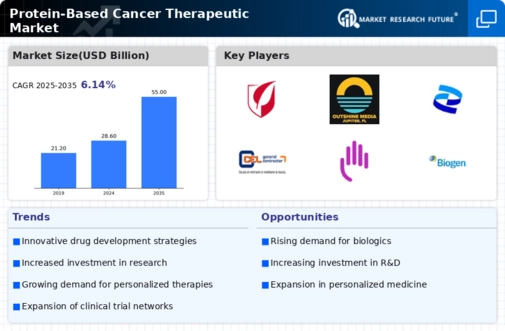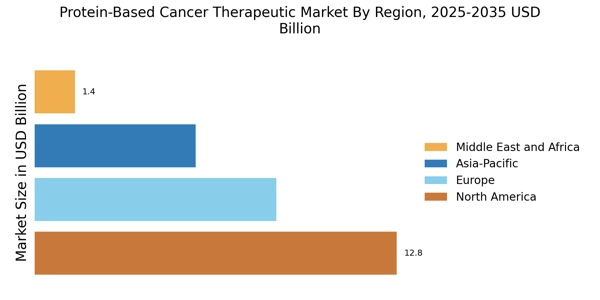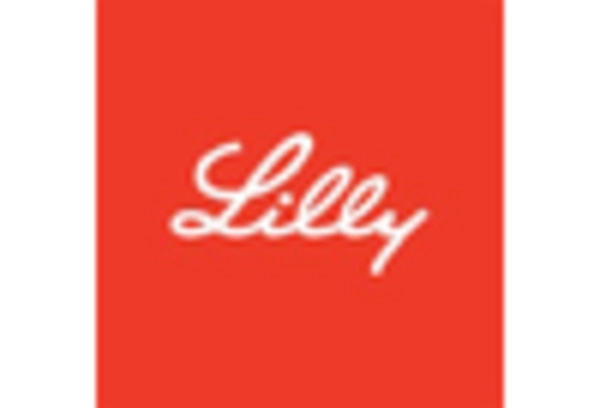Increasing Incidence of Cancer
The rising incidence of cancer worldwide is a primary driver for the Protein-Based Cancer Therapeutic Market. According to recent statistics, cancer cases are projected to increase significantly, with estimates suggesting that by 2040, the number of new cancer cases could reach 27.5 million annually. This alarming trend necessitates the development of innovative therapeutic options, particularly protein-based treatments that target specific cancer types. As healthcare systems strive to address this growing burden, investments in research and development of protein-based therapies are likely to surge. This focus on targeted therapies aligns with the increasing demand for personalized medicine, which aims to tailor treatments to individual patient profiles. Consequently, the Protein-Based Cancer Therapeutic Market is expected to expand as stakeholders seek effective solutions to combat the rising cancer prevalence.
Growing Investment in Cancer Research
Growing investment in cancer research is a significant driver for the Protein-Based Cancer Therapeutic Market. Governments and private organizations are increasingly allocating funds to support innovative research initiatives aimed at discovering new cancer treatments. In 2023, it was reported that global funding for cancer research exceeded USD 200 billion, reflecting a commitment to advancing therapeutic options. This influx of capital is facilitating the exploration of protein-based therapies, which are gaining traction due to their potential for targeted action and reduced side effects. Additionally, partnerships between academic institutions and pharmaceutical companies are fostering collaborative research efforts, further enhancing the development of novel protein-based cancer therapeutics. As investment continues to rise, the Protein-Based Cancer Therapeutic Market is poised for substantial growth, driven by the need for effective and innovative cancer treatments.
Regulatory Support for Innovative Therapies
Regulatory support for innovative therapies is increasingly shaping the Protein-Based Cancer Therapeutic Market. Regulatory agencies are recognizing the urgent need for new cancer treatments and are streamlining approval processes for protein-based therapeutics. Initiatives such as the FDA's Breakthrough Therapy Designation aim to expedite the development and review of therapies that demonstrate significant improvement over existing options. This regulatory environment encourages pharmaceutical companies to invest in the development of protein-based cancer treatments, as the path to market becomes more accessible. Furthermore, the emphasis on patient-centric approaches in regulatory frameworks is likely to enhance the focus on personalized medicine, which aligns with the capabilities of protein-based therapies. As regulatory support continues to evolve, it is expected to bolster the Protein-Based Cancer Therapeutic Market, facilitating the introduction of innovative solutions to combat cancer.
Rising Awareness of Cancer Treatment Options
Rising awareness of cancer treatment options is a crucial driver for the Protein-Based Cancer Therapeutic Market. As educational campaigns and advocacy efforts increase, patients are becoming more informed about their treatment choices, including the benefits of protein-based therapies. This heightened awareness is leading to greater demand for advanced treatment modalities that offer improved efficacy and safety profiles. Additionally, healthcare providers are increasingly recommending protein-based therapies as part of comprehensive treatment plans, further driving market growth. The trend towards shared decision-making in healthcare is empowering patients to actively participate in their treatment journeys, which may lead to a preference for innovative therapies. Consequently, the Protein-Based Cancer Therapeutic Market is likely to experience growth as awareness and demand for effective cancer treatments continue to rise.
Technological Advancements in Drug Development
Technological advancements in drug development are propelling the Protein-Based Cancer Therapeutic Market forward. Innovations in biotechnology, such as CRISPR gene editing and monoclonal antibody production, have revolutionized the way cancer therapies are developed. These technologies enable researchers to create highly specific protein-based therapeutics that can effectively target cancer cells while minimizing damage to healthy tissues. The market for monoclonal antibodies alone is projected to reach USD 300 billion by 2025, indicating a robust growth trajectory. Furthermore, the integration of artificial intelligence in drug discovery processes is streamlining the identification of potential therapeutic candidates, thereby accelerating the time to market for new protein-based treatments. As these technologies continue to evolve, they are likely to enhance the efficacy and safety profiles of cancer therapies, thereby driving the Protein-Based Cancer Therapeutic Market.

















